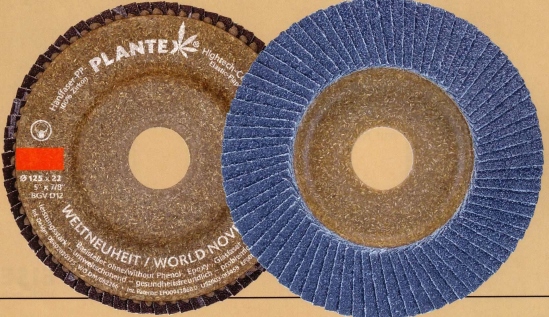On a worldwide scale approximately 120 million flap discs are used every year, and this number is only increasing.
In over 100 million of these instances the backing disc is made of a glass fibre fabric, bound with phenol or epoxy resin. When grinding and trimming a glass fibre backing disc, a harmful mixture of glass fibre dust and resin vapours is emitted into the air.
Furthermore, when disposed of, glass fibre discs are adding some three to four million kilograms to the world’s waste stream every year.
In response to these obvious occupational health and safety and environmental concerns these glass fibre discs have raised, a German company has developed what is believed to be the first flap disc in the world made of natural hemp fibres from THC-reduced, legally licenced hemp varieties.

The Plantex discs, developed by Eisenblatter, are now available in Australia from Queensland-based Mullner Enterprises.
According to Eisenblatter the hemp-based flap disc has been developed to replace the glass fibre disc, in the process eliminating the need for costly investment in breathing apparatus, extraction systems or encapsulation options.
The natural fibre high tech compound material required a new impact treatment process for hemp fibres to be developed before the required strength values for grinding discs could be achieved.
In the process green hemp plants are shredded so that the natural and inherent strength of the fibres are retained almost to the full. The fibres are neither bent nor broken, and are therefore not weakened.
The resulting material (hemp/PP) is harmless, can be disposed of easily and is made of sustainable natural materials that produce a good carbon dioxide balance throughout the process from production to disposal.
The polypropylene binding agent burns to approximately 1 per cent carbon when disposed of by thermal methods, producing almost zero residue.
The use of hemp/PP in manufacturing is not new. The material is already used in automotive interior applications and in a range of medical technology solutions including syringes, cannulae and infusion bottles.
However the beauty of hemp in this particular application is that the structure of the hemp fibre provides excellent tearing strength values, that aren’t in any respect inferior to technical or synthetic mineral fibres, such as glass fibres.
The cavities of the hemp fibre structure in conjunction with PP have a highly insulating, damping and noise-reducing effect.
Not only is it just as strong as glass fibre reinforced plastic, but it is more elastic, heat absorbent for low grinding applications and particularly easy to trim and dispose of.
Its natural elasticity means it adjusts better to curved workpieces. Because it yields, the grinding disc has a larger contact surface area and therefore naturally removes more material. The larger contact area also dissipates more heat, which means the grinding area is cooler and the workpiece doesn’t glaze, so thin stainless steel plates will not lose their shape so quickly. The grinding fabric will also not burn.
The Plantex flap discs also cost no more than conventional flap discs with glass fibre backing, making grinding operations now not only safer and more environmentally friendly, but free of any cost/benefit trade off.
For more information contact Mullner Enterprises, Tel 07 5546 6026.
(Vgl. Meldung vom 2004-11-03.)
Source
ferret.com.au May 03, 2005.
Share
Renewable Carbon News – Daily Newsletter
Subscribe to our daily email newsletter – the world's leading newsletter on renewable materials and chemicals









